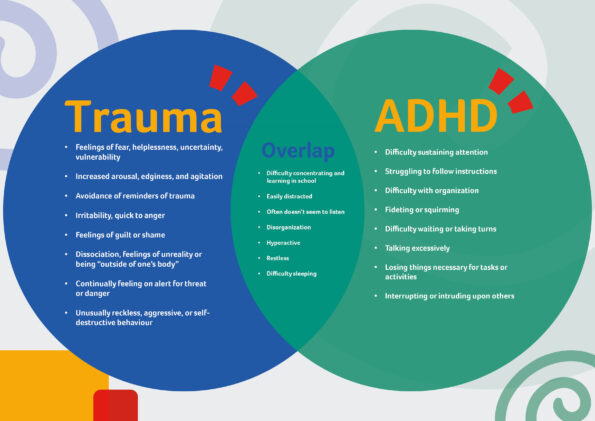
Exploring the Relationship Between Trauma and ADHD in Foster Care
What is ADHD?
ADHD stands for Attention Deficit Hyperactivity Disorder. Around 3 million people in the UK have ADHD, and many people, particularly women and girls, live with the condition undiagnosed. As children grow, not receiving proper support for their condition can lead to difficulties in pursuing higher education, succeeding in employment and managing relationships.
Types of ADHD and their symptoms
Predominantly Inattentive: Symptoms include making careless mistakes, struggling to follow instructions, failing to complete tasks and losing things.
Predominantly Hyperactive-Impulsive: Symptoms include restlessness, talking excessively, finishing people’s sentences for them and struggling to stay seated or wait turns.
Combined-type ADHD: Children and adults with this type of ADHD display various traits of both inattentiveness and hyperactivity/impulsivity.
The overlap between ADHD and trauma
Many children in foster care live with Complex Developmental Trauma due to the challenging circumstances they’ve faced at home, which can include witnessing domestic violence, facing abuse or experiencing the death of a parent.
“I’d liken trauma to a deep wound that a person tries to hide, but which causes so much pain that they’re unable to function to their full potential,” said Maria, one of our consulting trauma-trained and informed ISP therapists. “Trauma can impact a child’s cognition, their development, their emotions and their ability to form good quality relationships.”
The impact of trauma on the developing brain can look very similar to ADHD. Some symptoms of both trauma and ADHD include:
- Struggling to concentrate
- Facing challenges at school
- Being restless or seeming hyperactive
- Struggling to sleep
- Executive dysfunction
Lots of children in foster care live with both trauma and ADHD. When combined, the symptoms of one condition can exacerbate symptoms of the other. That’s why it’s so important for foster parents and other professionals to be able to recognise the differences between trauma and ADHD and where they overlap.

How practitioners tell the difference between ADHD and trauma
Some symptoms of trauma, such as hypervigilance, may be mistaken for signs of ADHD like inattention or restlessness. To decipher whether a child is exhibiting signs of childhood trauma, ADHD or both, professionals will seek to understand whether or not ADHD-adjacent symptoms were present in the young person before they were exposed to traumatic circumstances.
However, given the complex home lives of children who come into foster care, it is often difficult to pinpoint exactly when symptoms began – after all, many children who come into care will never have experienced a ‘normal’ or healthy home environment.
When conducting an ADHD assessment, clinicians will conduct a comprehensive evaluation which takes into account family medical history and observations of the child’s behaviour in different settings. When such a detailed assessment is conducted, often clear indicators of trauma will arise, such as dissociation, self-destructive behaviour and intense feelings of fear.
Top tips for supporting a child with ADHD
ISP therapist Maria, who has lived experience of raising her own children with ADHD, kindly shared with us her top tips for supporting children in foster care with the condition.
1. Take the time to truly understand your foster child.
Maria’s first piece of advice to any foster parent caring for a child with ADHD is to be observant and empathetic. She said,
“Traumatised children need the understanding, unconditional acceptance and empathy of a solid, safe adult who can help them regulate. A key part of a foster parent’s role is to gain a deep understanding of a child’s history and how their unique circumstances and life experiences impact them on a day-to-day basis. It’s important to remember that children with trauma and ADHD live in a world which isn’t built to accommodate their needs. Everything takes more effort, and they’re always having to work extra hard to achieve. You’ll make a huge difference simply by being alongside them on their healing journey and being their advocate.”
2. Create an environment which allows your foster child to thrive.
“Children with ADHD need consistent and nurturing environments. Establishing routine around things like homework and bedtimes is so important in creating consistency and a sense of safety. Remember that children with ADHD can become easily overwhelmed— mistakes are inevitable, but rather than lecturing a child, use P.A.C.E parenting techniques to provide clear boundaries and provide brief, simple instructions which will support them.”
3. Use co-regulation strategies.
“Many children who have experienced trauma will not have learned how to express their needs or manage their emotions in a safe and healthy way. Here at ISP we believe in the importance of therapeutic fostering, and we teach our foster parents how to co-regulate with their foster child. Over time this teaches children how to develop healthy coping strategies and manage their emotions independently.”
“Things like breathing exercises or blowing bubbles, listening to calming music or reading a favourite storybook together are just a few simple things which can help bring children back to a state of calm. Movement can be especially important for children with ADHD – sensory experiences like a good long shower, play time in a sand pit or simply turning on some good tunes and having some fun dancing together can work wonders.”
4. Make the most of your support network.
“Consulting with professionals and seeking support is vital, as we can help you to gain insight into your foster child’s behaviour and needs. All of our therapists are trauma-informed, meaning we can help develop customised support for your young person. ISP also offers a wonderful Therapeutic Pathway of training which will give you lots of tools to support the young people in your care. We’re also proud to host lots of events like support groups for our foster parents, bringing everyone together to share ideas and offer advice – a problem shared really is a problem halved.”
What to do if you think your foster child might have undiagnosed ADHD
If you believe a young person in your care may be living with undiagnosed ADHD, the first step is to speak with the child’s GP. Check out the NHS’ guidance on seeking an ADHD assessment for a child or young person.
While our team of Psychotherapists here at ISP are not qualified to diagnose your foster child, we’ll be on hand to assist you in gathering important observations about your foster child’s behaviour and will support you in approaching the GP for a referral for assessment. Furthermore, we have Education Coordinators who can work with your foster child’s school to help gather important information for the referral process – together, we’ll get your young person the right support.

Could you foster a child with additional needs?
If you’re interested in becoming a foster parent, we encourage you to enquire with our team today. As the UK’s longest established Independent Fostering Agency, you’ll know you’re in safe hands when you choose to foster with ISP.
All ISP foster parents receive a fantastic course of trauma-informed training to equip them with the skills they’ll need to guide each child on their healing journey, as well as a generous fostering allowance which reflects your expertise, and access to expert guidance from our experienced therapeutic team.
Recommended resources for parenting a child with ADHD
Check out our recommended books and articles below to boost your knowledge.
- ‘Can I Tell You about ADHD? A Guide for Friends, Family and Professionals’ by Susan Yarney
- ‘Taking Charge of ADHD: The Complete Authoritative Guide for Parents’ by Russell A Barkley
- ‘Understanding Girls with ADHD’ by K.G Nadeau (et al)
- Our Knowledge Hub is filled with fantastic resources for foster parents, including advice on parenting children with complex needs.

Fostering a Child With Complex Needs
This collection is aimed at foster parents to support you when caring for children with complex needs.

Fostering Teenagers With Trauma
One of the main causes of trauma in children in care is abuse and neglect. Learn more about caring for teenagers who have experienced trauma today.

Free SEND resources for foster families
As a foster parent of a child with SEND, you might be wondering where to get support? Here are ten resources to help you support your foster child at school.